Bishkek – A Wedding in the Capital
Moken big house became very crowded since the previous week, when relatives from Toktogul all flooded the house complex. Moken house was considered quite big, located at the outskirt of Bishkek, at least 40 minutes by car from the city center. He should be considered a middle class, if not rich, in the living standard of Kyrgyzstan. He had an expensive car as he was a taxi driver plying Toktogul – Bishkek road, and his house consisted of several separated buildings, including a stable which housed his numerous sheep and goats. As in Tajikistan, in Kyrgyzstan taxi drivers generally had quite high position in society spectrum of the people. Everybody in Toktogul knew about him.
Moken had three sons. The eldest, Timur, has just married to a girl recently. Both of Timur and Zarina, his wife, were very young, not more than 20 years old. In Central Asia, people marry at very early age. Timur and Zarina lived together since their marriage a month before. Now they were preparing for the reception. It was weird for me that the reception had to wait long after the marriage. Maybe Moken was too busy or he was counting for the luckiest day to perform this big event.
Indeed preparing for a wedding party was a big deal. Not only they had to prepare for the food (especially mountains of deep-fried snack called borsok), the place, the programs, they also had to take care of the visiting guests from Toktogul. Kyrgyz usually has big family. For a party like this, people who were considered as relatives ranged from the family, the extended family, and even included brothers and sisters of uncle’s wife, for example. Family relationship was still very strong in rural Asia, and especially Kyrgyzstan. Actually we still could notice how Kyrgyz language had many different words to say ‘uncle’, like ‘uncle from father’s side younger than father’, ‘uncle from father’s side older than father’, ‘uncle from mother’s side younger than mother’, and ‘uncle from mother’s side younger than mother’. This complicated vocabulary of family system showed how strong family relation in their culture was. Compare this with Indonesian language which only even has one word for both of ‘grandson’ and ‘granddaughter’.
While Moken’s house became very lively with the coming of relatives whose relations I would never understand, Moken were very busy but still hospitable in welcoming his guests. The preparation for the wedding started since two days ago, when they cleaned the house, decorated the rooms, fitting the costumes of the happy couple, and so on. The relatives also brought many young babies, like the cute little Tolkun Bek (3 years old) and Jenghiz Bek (2 years old) who kept running, playing around, fighting, beating the little dog, kicking the cats, and crying loud. There were more than a dozen children so you may imagine how the atmosphere was.
There was also a strong horse in the yard. It was a big one. I thought that it was Moken’s horse. But yesterday morning, Nurlan, Timur’s brother, said, “Today this creature will die.” I didn’t believe that they would kill the horse. But yes, they did.
I was out when they slaughtered that poor horse. I remembered this horse was kicking in the morning, tried hard to escape from the ropes, and tried its best to kick Nurlan when Nurlan punched it. It was a live creature. Now what I was seeing was a group of Kyrgyz men exploring its opened stomach, dividing the material inside the stomach into different groups, and the Kyrgyz women nearby washed the poor horse’s meat and sliced it into small pieces. I felt relieved I didn’t see how this animal was slaughtered.
Muslims follow strict rule of slaughtering animal. The animal’s neck is cut by a small knife while the name of God has to be whispered continuously. You can imagine killing a big horse like that with a small knife. It brought so much pain for a long time to this horse. The ladies told me the killing was very difficult. Many men held this horse as it kept kicking.
That kicking creature, seeking way of survival, now turned to be loaves of cut meat, plus a blooded skin, a screaming dead face, and four standing legs. Today this animal met his end.
While the horse was slaughtered with a small knife (it was not that small, but still it was small … ![]() ), the men used axes to cut its strong meat into pieces. A horse is an active animal and for sure its meat contains more muscle than fat. The axe to cut the meat was the same axe as the men used to cut the firewood. Even with axe it was difficult.
), the men used axes to cut its strong meat into pieces. A horse is an active animal and for sure its meat contains more muscle than fat. The axe to cut the meat was the same axe as the men used to cut the firewood. Even with axe it was difficult.
I tasted for the first time the horse meat when they served beshbarmak (literally means five fingers) for dinner. This food is considered as Kazakhstan’s national food, but as Kyrgyz shared most parts of its culture with the Kazakh, beshbarmak was also folk staple here. It was a mixture between Chinese and nomadic culture. The main part of the dish is large flat noodle. This came from Chinese culture. The other main part is the meat, which was usually horse meat but lamb is also acceptable. The nomadic culture is shown by how you eat it. Beshbarmak, as its name shows, traditionally is eaten with hand. I saw beshbarmak in Moken’s party was more meat matter rather than the noodle. He served some spoonfuls of noodle with pieces of meat each as big as an apple at least (some pieces were even bigger than a melon). Then it started the eating ceremony. Everybody grabbed the meat and ate the oily, though meat pieces with their two palms (I think they should rename it as onbermak – ten fingers – then). Nothing was heard except sounds from busy lips to pump the oily noodle and meat to the hungry mouth. It was noisy. But it was solemn as well. Everybody concentrated on eating and no conversation was happening.
For sure westerners don’t eat horse meat, as horse, like dog, are man’s best friends. For the Kazakh and Kyrgyz, horse meat is part of the national dish. As they were Muslims, they also said that horse meat was halal (permitted). Muslims in Indonesia don’t eat horse meat, because it’s not a common staple. Some Muslim friends told me, according to their teacher, eating horse meat is makruh (permitted but better not to do it). You may eat horse meat when other food is not available.
Whether it was permitted or not, I doubt the Kazakh and Kyrgyz, who were used too long with their nomadic life, would follow the proper Islamic way. Remember how vodka was so important in their life and the fact that the people were willing to pay much to get the best quality of Russian sausage, of course made of pork. So even if horse was not permitted in their religion, most people wouldn’t care too much about it.
Talking about vodka, of course it should be available in this wedding party. Moken’s mother was busy since morning to filter the vodka from bottle to bottle. The vodka would be served in wedding party.
It was a westernized wedding anyway. Timur wore western suit with necktie. Zarina was made up by beauticians as an angel in white gown. The wedding car was decorated with balloons like the decoration in a child wedding party. Some elder men in western suits, plus the ak kalpak, the white Kyrgyz hat, which was the only thing to confess that this party happened in Kyrgyzstan.
While the Kyrgyz might strong enough to resist the Arabic influence in their religious life or people’s names (they prefer Kyrgyz names rather than having Arabic names), they might be not that strong to resist the fun offered by Russian culture. Before entering the hall, lead by a Master of Ceremony, the bride and groom shared glasses of wine. During the wedding party, first Moken and his wife thanked everybody who came, and invited the important guests, one by one, to give blessings to the happy couple. The blessing was accepted by happy Timur and Zarina by standing up, and when the guest finished their congratulations and blessings, Timur and Zarina drank a glass of alcohol. The music then started. The guest started to sing or to dance, followed by other guests in the hall. This wedding party resembled more as a dancing party to me.
The singers in the party ranged from normal guest to a celebrity. Moken was such an important man that he could invite Aziza, a very famous singer in Kyrgyzstan. Aziza happened to be from Toktogul, and as everybody else from Toktogul, she knew and respected Moken. Aziza’s songs brought the lively atmosphere to the party, and the guests, men and women, danced together under the air of vodka smell.
Zarina also came to the dance hall. She danced with other young male guests also. It seemed that as she was going to start a secluded life with her husband, this would be her last chance to satisfy her male friends. She danced in her beautiful white grown with the happy young males. Timur also danced. Moken and his wife did too.
The party lasted until midnight.
It was a pity that this happy party was ended with accident. Moken’s grandfather, a very old man with white beard, was beaten by drunken men when he tried to get to his car. Central Asians always respected old people. They called old people as ‘ak sakal’ or ‘white beard’, and nobody was supposed to behave improper to ak sakal. It happened at the middle of night, just near the wedding hall.
Suddenly, rain started and turned to be snow. It was strange as the day was very sunny. This was the first snow I have seen this year. Cold was the weather, burnt was the emotion of the people. The two drunken men who were supposed to beat Moken’s grandfather were suddenly surrounded by angered guests and were punched by the angry women. You would never imagine how a Kyrgyz women when they got angry. Not only had their lips produced harsh scolds, their hands also had landed many times on these two young men’s face. The two accused men got bloody face in a minute, and they were brought to a room surrounded by these angry ladies.
Aziza just looked at the mess but said nothing. Moken’s wife, Ergenje Eje, slapped the men many times. The men denied that they beat the old man. The more they denied, the more fiercely she slapped on their faces. Policemen came. They interrogated the people. It became a mess as everybody wanted to say something. At first I could catch what they were saying as the policeman spoke Russian. But then everybody spoke Kyrgyz, which I understood almost none.
Until three o’clock, the quarrel and debates last. It was freezing. The wedding party left mixed emotions to everybody.

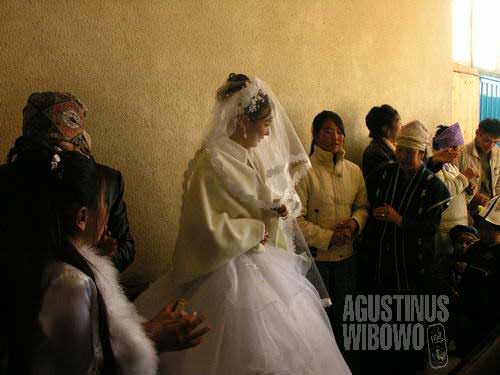
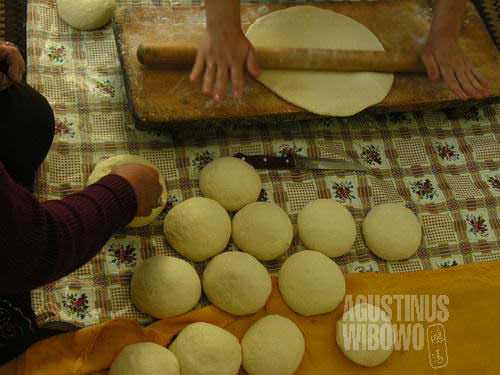
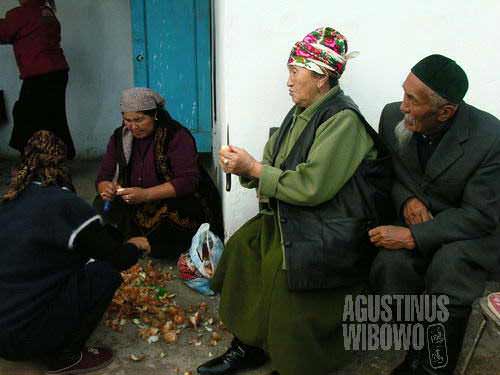
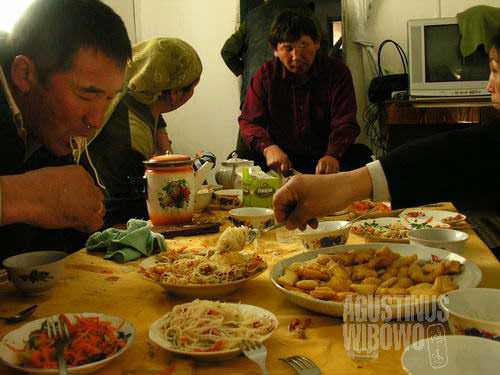
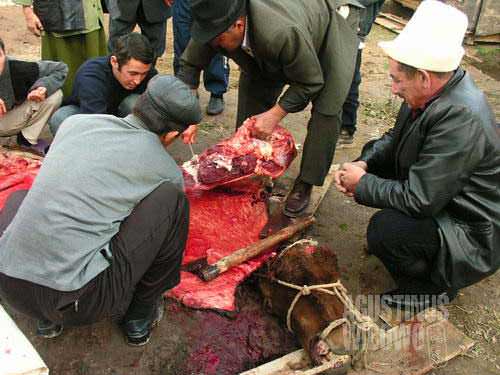
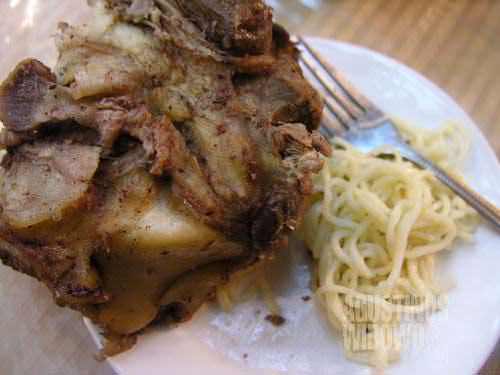
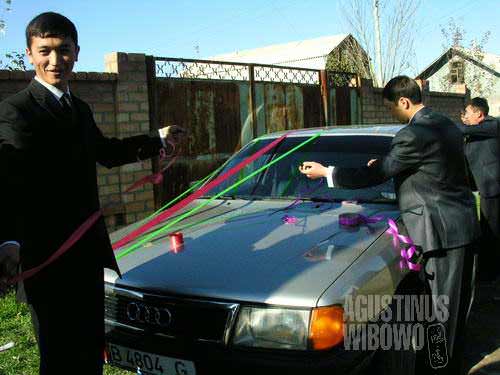
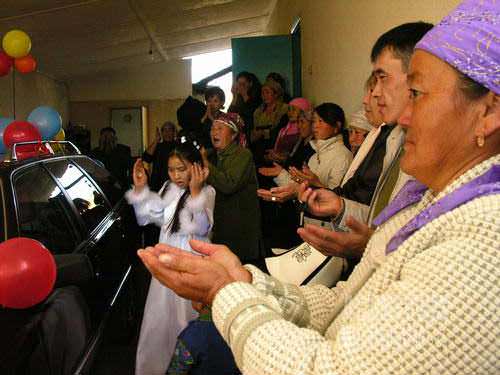
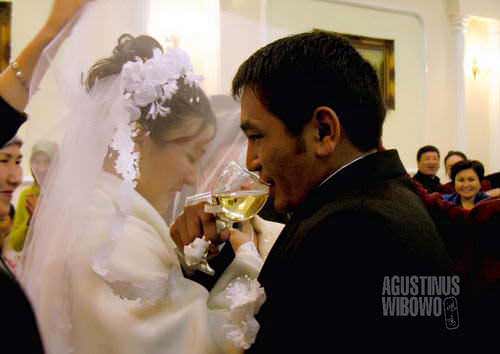
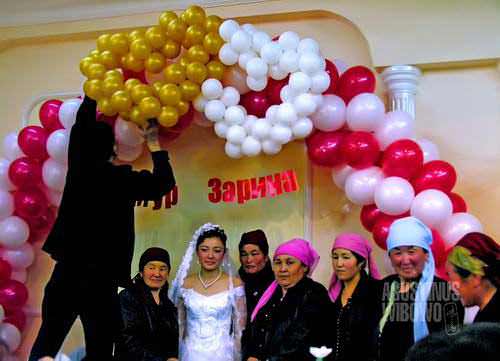
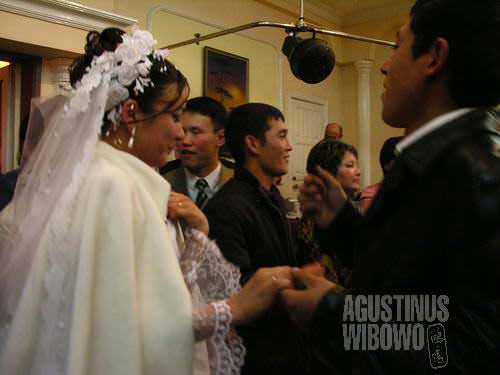
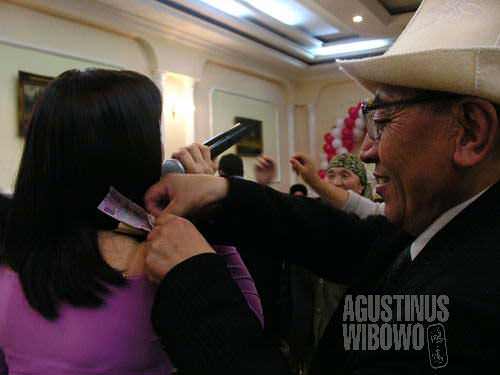
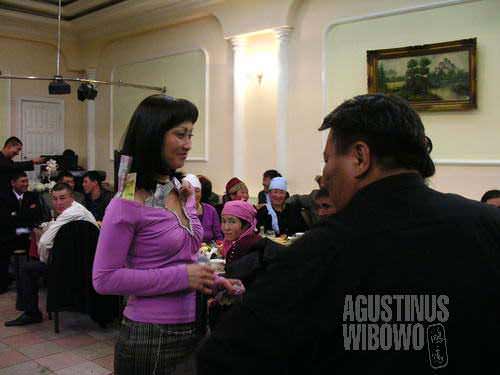
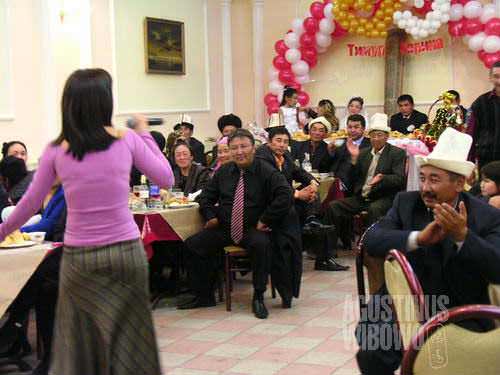
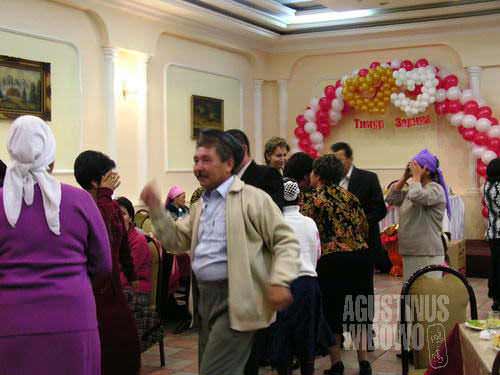
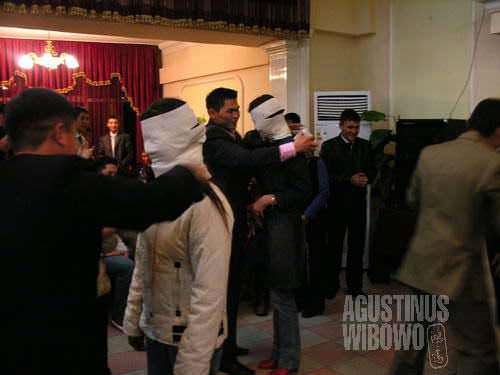
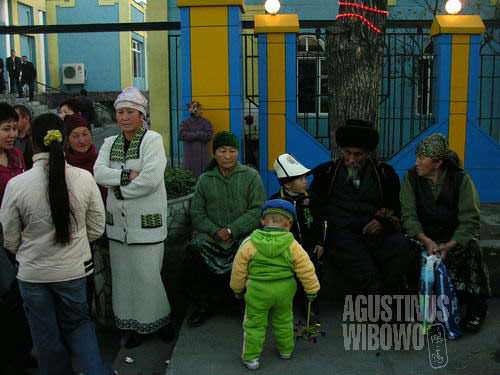
Leave a comment